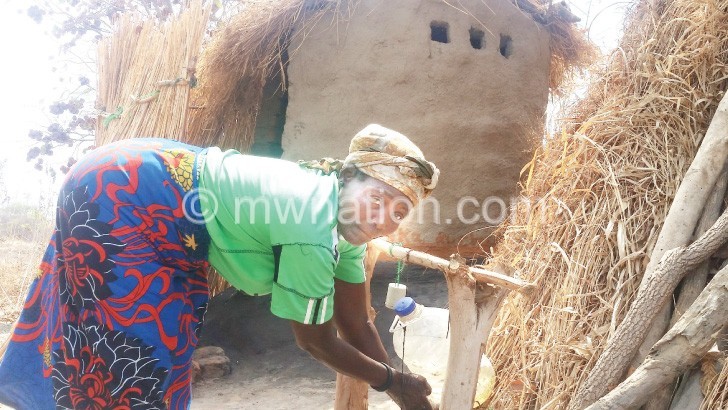Villagers at war with stinking foe
Lusitiya Banda was displaying pieces of boiled cassava on a makeshift stand when we met her at Chulu Trading Centre in Kasungu. People come and go, some eating what they buy. In this buzzing setting, the 58-year-old hopes to make enough money to feed her family.
However, the traders and their customers were at the risk of being infected with sanitation-related diseases because there was no latrine in the vicinity. When nature called, they used to rush to nearby shrubs where the humming of green flies, sights of human excreta and a resulting pungent smell are quite haunting.
“With the flies from the stinking bush, our lives were at risk. Even our businesses were highly shunned. People did not want to eat faeces,” she says.

The people “who used to eat their own excretion” have overcome open defecation, a well-known risk factor for numerous episodes of diarrhoea, dysentery, cholera and other sanitation-related diseases, following an intervention by World Vision Malawi (WVM).
According to area monitoring team chairperson James Khaulani, almost 80 out of 100 villagers had no latrines and were defecating in the open before WVM arrived.
“The few latrines were unhygienic and not attractive. There were no hand-washing facilities,” he says.
The disease burden was enormous. Senior health surveillance assistant Maxwell Kabaghe remembers Chulu Health Centre treating up to 1899 diarrhoea patients in 2013.
“Open defecation was a way of life,” the community-based health worker says. “The latrines were so dirty that myths had it that those using them were at the risk of being attacked by spiders from the hole. Pregnant woman feared to lose their unborn babies.”
But the picture has been changing since WVM launched a door-to-door community awareness push. Diarrhoea cases are dropping as households own and use hygienic latrines.
“We hope nearly all diseases emanating unsafe water, sanitation and hygiene will be totally eradicated if we eradicate open defecation forever,” says Kabaghe.
WVM area programmes manager Kenani Nyirenda said the Water, Sanitation and Hygiene (Wash) initiative was conceived to safeguard up to 20 000 children from widespread waterborne diseases.
“Gladly, all the 145 villages in Traditional Authority [T/A] Chulu heeded the calls for every household to have a latrine. The children no longer live in a community where their well-being is compromised,” he says.
Faced with land shortage, Salipira villagers have constructed several pit latrines on a strategic spot.
They encourage each other to use the latrines responsibly.
Salipira is one of the villages with access to safe water, thanks to 90 boreholes sunk by WVM.
“Before we knew the importance of latrines, safe water and hand washing, my children were missing classes due to frequent incidences of diarrhoea. I also wasn’t able to participate in different development activities. I was spending most of my time at the health centre,” says Miriam Kayuni a resident in the village.
Village head Salipira commends the people for their positive response to sanitation and hygiene, saying his area may be underdeveloped because productive citizens wasted countless hours fighting water-borne diseases.
“Almost every household has a toilet and a hand washing facility. My village is clean, hygienic and we have healthy and happy families. We owe all of this to World Vision,” he says.
Chulu Health Centre medical technician Wetson Kawerama said the pressure health workers from the communities were experiencing at the hospital has drastically decreased.
“We were registering many cases. A day could not end without four or more diarrhoea patients. Now, a week passes without seeing one,” he says.
Malawi is one of the countries that committed to achieving Sustainable Development Goals (SDGs). Goal six requires all United Nations (UN) member States, including Malawi, to ensure access to water and sanitation for all by 2030.
So far, government records indicate that the country has achieved over 80 percent of it. However, government last year missed its target of ensuring all 263 T/As are free from open defecation.
Just about 12 had met the deadline, but Minister of Health Peter Kumpalume is optimistic to achieve universal access to latrines.
Says he: “To close the gap, we need every Malawian to change mindset and get involved in the fight against unsafe sanitation practices.”n





